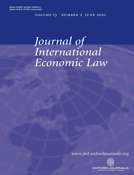-
Views
-
Cite
Cite
Aaron Xavier Fellmeth, Below-market Interest in International Claims Against States, Journal of International Economic Law, Volume 13, Issue 2, June 2010, Pages 423–457, https://doi.org/10.1093/jiel/jgq015
Close - Share Icon Share
Abstract
The article deals with an important but strange contradiction in international legal practice. The official doctrine provides that states must fully compensate all damage caused by an internationally wrongful act. Yet, when it comes to compensating the injured party for the delay caused by the state’s failure to compensate promptly (usually awarded in the form of interest on the direct damages), international tribunals almost universally shy away from awarding the full economic measure of interest. The consequences of the systematic undercompensation of claimants in international law assume special gravity because of the long period of time that typically elapses between the injury and the award by a tribunal or claims commission. The delay commonly exceeds three years and sometimes extends to 10 or 15, during which time the value of an interest award begins to overshadow the value of the direct damages award itself. This institutionalized undercompensation of claimants occurs in every international human rights case, and more often than not elsewhere, from wrongful expropriation of property cases to breach of international contract claims. This article analyzes and attempts to explain this disconnection between doctrine and practice, and to relate it to the nature of the international decision-making process.



